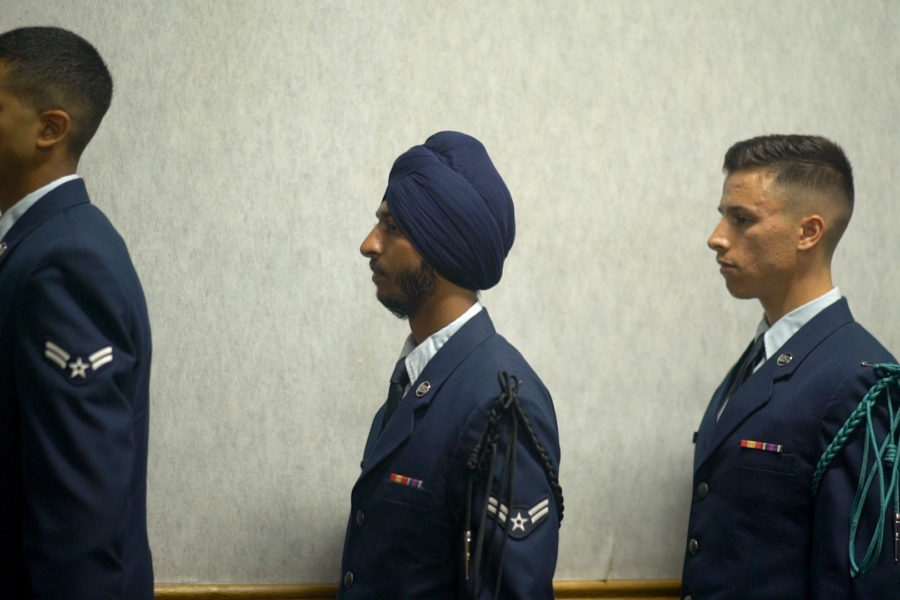Airmen, Guardians, and other service members that wear beards for religious reasons will be deemed nondeployable as part of Defense Secretary Pete Hegseth’s sweeping crackdown on shaving waivers—a move that would essentially end their careers and one that several former Air Force officials say may go too far in trying to restore grooming standards across the military.
Sikhs, Muslims, and other religious groups serving in the U.S. military have been permitted to wear beards in uniform under religious accommodations since 2010.
Late last month, Hegseth told hundreds of senior leaders that he is ending the “era of rampant and ridiculous shaving profiles” in an effort to tighten grooming standards that leaders have failed to enforce over the years. A subsequent Sept. 30 memo on “Grooming Standards for Facial Hair Implementation” prohibits beards, goatees, and other facial hair that could interfere with a proper seal on a chemical protective mask or firefighter respirator. Beard waivers for religious accommodations “will be limited to non-deployable roles with low risk of chemical attack or firefighting requirements,” the memo states.
“In an era of increasingly complex operational demands—including high-tempo deployments, multi-domain warfare, and expanded emergency response roles—strict grooming compliance ensures personnel can safely and effectively employ protective equipment,” the memo states.
Mustaches are still authorized but must be neatly trimmed and not to extend past the mouth corners or into the mask’s seal zone, according to the memo.
Service members failing to comply with Pentagon’s new beard policy will be flagged as non-deployable, a status that makes Airmen and other service members vulnerable to administration separation if they go 12 consecutive months without deploying.
The effect on careers is significant, said former Chief Master Sergeant of the Air Force Gerald Murray.
“Having a beard for religious accommodations should not affect your deployability,” said Murray, who retired in 2006 after serving 29 years in the Air Force. “That is not fair, and that is not the way to do it.”
Retired Air Force Maj. Gen. Randall E. Kitchens, former Air Force Chief of Chaplains, said he is hopeful that service members that are required to wear beards as part of their faith will be evaluated fairly during the individual review process.
The language appears to follow “all the proper steps; the only concern that I have is that ‘approvals will be limited to non-deployable roles,’” Kitchens said, adding that “it’s too early to tell if that is fair or not.”
That being said, Kitchens said he remembers when the U.S. military did not grant religious accommodations before 2010.
“To me, the religious accommodation piece was vitally important because there were religious requirements that were not being allowed,” said Kitchens, who now serves as the National Chaplain for the Air Force Association. “Looking at it from a First Amendment right … our Muslim chaplains, Jewish chaplains, and our Sikh personnel that have that religious requirements were being denied that.”
From a practical standpoint, former Assistant Secretary of the Air Force for Manpower and Reserve Affairs Alex Wagner said the memo’s argument that beards will prevent service members from obtaining a proper seal on their protective masks is flawed—and thus the decision to make bearded service members nondeployable is unnecessary.
“The idea that having facial hair would make you nondeployable, because in a chemical or biological environment, you would not be able to get a seal in your gas mask and would present a risk to others is patently false based on the science,” Wagner argued.
A 2018 study of civilians showed that 98 percent of study participants who had an eighth-inch of beard achieved acceptable fits on civilian half-face negative-pressure respirators, comparable to the M-50 gas masks used in the military today. And Wagner said the Army conducted its own research in 2016 when several Sikhs volunteered to test their mask seal in a tear gas chamber at Aberdeen Proving Ground, Md.
“That issue was laid to rest in 2016 when the Army tested the assumption of whether or not Sikhs could get a seal with a gas mask, and they could,” said Wagner.
While the former officials wait to see how the religious accommodation process plays out, they did say they saw issues with the existing system that have led Hegseth’s crackdown.
“Clearly in the Air Force we have had senior NCOs that that felt like that they could not or should not be enforcing standards of discipline,” Murray said, clarifying that he’s not against legitimate beard waivers for religious beliefs or medical conditions, as long as there is a clear “definable standard” that can be easily enforced.
Kitchens also clearly recalls how the enforcement of standards on beards has slipped over the past 15 years.
There were applicants “gaming the system” to use the correct wording to get religious accommodations approved, Kitchens said. Leaders were uneasy about approaching service members if their beard appeared out of standard, fearing complaints of harassment.
The current Air Force’s standard states that Airmen wearing beards under religious accommodation must ensure they don’t exceed two inches “when measured from any point on the neck, chin, or cheeks,” according to a July 11, 2025 guidance memo on Air Force DAFI 36-2903, Dress and Personal Appearance.
But supervisors were uncomfortable asking because “feared that there was going to be a report on them and then an investigation,” Kitchens said. “They were not clear on the standard, and who had exception to policies … so they didn’t want to go call someone out and then get accused of targeting.”
Wagner agreed enforcement has been a challenge, partially because the standards are intentionally broad because of the way the courts have interpreted it on religious accommodations.
“The last thing you wanted, at least in the Air Force, was a first sergeant walking around every time you saw a beard, saying ‘show me your papers, show me your papers, show me your papers,’” Wagner said.
Before he left office, Wagner, a political appointee under President Joe Biden, said he was involved in setting up a policy standards working group last fall to ensure standards were enforceable, but he is unsure of the status of the working group effort.
“I think you have to have clearer standards that the decision-makers at the unit level can understand and then enforce. Wearing the uniform matters, having regulations that are enforceable matters. It matters for discipline, it matters for cohesion, it matters for a sense of team,” Wagner said.
“All of those things are important values—that said, you have to follow the law, and the law and religious accommodation is crystal clear,” Wagner added, referring to the Religious Freedom Restoration Act.
Under the Pentagon’s new beard policy, service secretaries have until Nov. 30 to submit implementation plans to the Under Secretary of War for Personnel and Readiness, the memo states, referring to the secondary title for the department that was approved by President Donald Trump.
An Air Force spokesperson did not provide further details about the effort except to say that service does not track the number of Airmen with religious accommodations, since it is maintained at the unit level.





